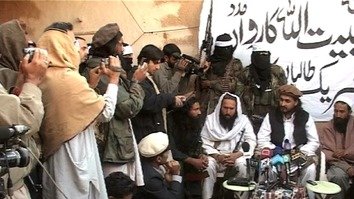ISLAMABAD -- The massive bomb dropped last week by the US military on "Islamic State of Iraq and the Levant" (ISIL) militants in Nangarhar, Afghanistan, was a loud and clear message of no tolerance for militancy, Pakistani security analysts say.
The GBU-43/B Massive Ordnance Air Blast bomb, with a blast yield equivalent to 11 tons of TNT, was unleashed in combat for the first time April 13.
The bomb struck a tunnel complex of ISIL militants in eastern Afghanistan, killing about 90 militants, according to Afghan officials, who also ruled out any civilian casualties.
Afghan and military officials expect the bombing to erode ISIL's capabilities in Afghanistan and to convey a warning to the Taliban ahead of their annual spring offensive.
Pakistan welcomes US commitment against ISIL
Maj. Gen. Asif Ghafoor, director-general of the Pakistani Inter-Services Public Relations (ISPR), expressed his support for the joint US-Afghan military operation.
The attack reflects the US commitment against ISIL, whose prime target is youth, he said during a press conference Monday (April 17).
"I welcome this attack if it targeted hideouts of ISIL in Afghanistan," Akram Zaki, former chairman of the Senate Standing Committee on Foreign Affairs, told Pakistan Forward.
The hideouts of all terror outfits having strong presence in Afghanistan must be destroyed, he added.
The attack was a clear signal that militancy would not be tolerated by the "international community in Afghanistan or anywhere else," said Imtiaz Gul, executive director of the Islamabad-based security think-tank Centre for Research and Security Studies (CRSS).
"After this development it will be very difficult for ISIL, Tehreek-e-Taliban Pakistan (TTP) and their allied terror outfits to have a strong footing in Afghanistan or to carry out their mission of spilling blood in Afghanistan and Pakistan," he told Pakistan Forward.
Fighting a common enemy
"If we go by the statements of Afghanistan, Pakistan, the United States and some other countries, it seems that ISIL is their common enemy," Gul said, adding, "The US strike on ISIL paves the way for a joint strategy to evolve [...] to crush the terrorist groups engaged in Afghanistan and Pakistan."
"Afghanistan and Pakistan are the key targets of ISIL militants hiding in Afghanistan and the US action against ISIL was in direct support for both these neighbouring countries' fights against militancy," he said.
"The American bombing of ISIL's hideouts may have destroyed the [terrorist group's] efforts of having a firm base in Afghanistan, which could serve as the nerve centre for their actions in both the countries -- Afghanistan and Pakistan," Lt. Gen. (ret.) Javed Ashraf Qazi, a senior military analyst, told Pakistan Forward.
"ISIL's Khorasan chapter is in its infancy," he said, adding that the militants are attempting to lay down their roots in Afghanistan "so that if they are pushed out from Iraq and Syria, they can move in to this base."
To prevent that from happening and to completely crush militancy in the region, joint efforts must be made to target all terrorist groups operating in Afghanistan and Pakistan, he said.
Discouraging militancy in Pakistan
"ISIL penetrated Afghanistan in 2015 and started its agenda of shedding blood," Brig. (ret) Mehmood Shah, former security secretary in the Federally Administered Tribal Areas (FATA), told Pakistan Forward.
The same year, some banned militant outfits in Pakistan declared allegiance with the terrorist group, he said.
"To discourage militancy, a counter-insurgency operation should be launched in Afghanistan by the Afghan security forces and other key allies in the war on terror," he told Pakistan Forward.
"The strategy of the allies in the war on terror in Afghanistan should be very clear to discourage extremism and militancy," he said.
ISIL and its supporters in Pakistan have carried out some major attacks in the country since 2016, Shah said.
On May 13, 2015, ISIL and TTP elements killed 45 members of the Ismaili community in Karachi during attack on a bus near Safoora Goth. This was the first major terrorist attack claimed by the two groups in Pakistan.
In 2016, ISIL has claimed responsibility for killing 203 Pakistanis in various terrorist attacks, according to the CRSS annual security report, published March 22, 2017.
TTP, TTP offshoot Jamatul Ahrar, Lashkar-e-Jhangvi al-Alami and Lashkar-e-Islami have carried out some attacks with the collusion of ISIL, the CRSS report said.

![Afghan security forces take part in an ongoing operation against 'Islamic State of Iraq and the Levant' (ISIL) militants in the Achin district of Afghanistan's Nangarhar province on April 14, 2017, a day after the US military struck the district with its largest non-nuclear bomb. The US military's largest non-nuclear bomb killed dozens of Islamic State militants as it smashed their mountain hideouts, Afghan officials said April 14, ruling out any civilian casualties despite the weapon's destructive capacity. [Noorullah Shirzada/AFP]](/cnmi_st/images/2017/04/21/7708-000_nj7wr-585_329.jpg)






